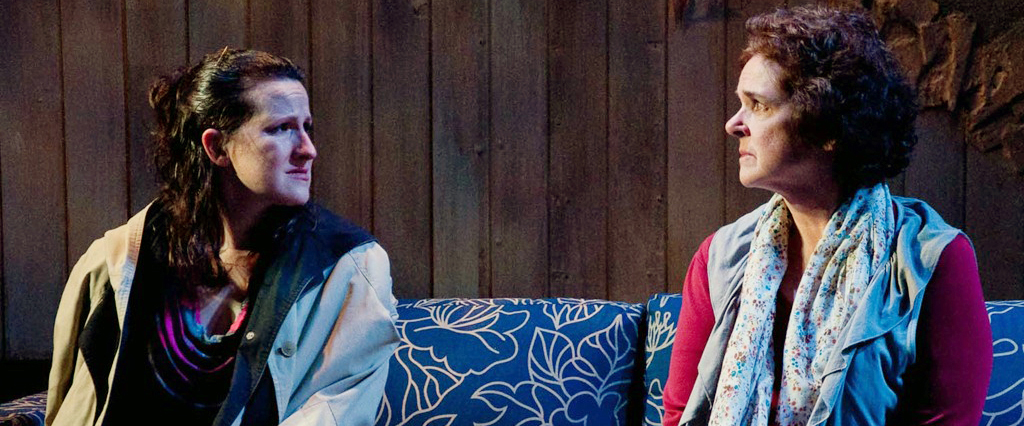Review of 'Gjenganger'
Chicago based Akvavit Theatre's presentation of Jon Fosse's three plays.
-
 Norwegian author and dramatist Jon Fosse. Photo courtesy of kornbergpr.com
Norwegian author and dramatist Jon Fosse. Photo courtesy of kornbergpr.com -
-
Review of 'Gjenganger'
Chicago based Akvavit Theatre's presentation of Jon Fosse's three plays.
Fateful encounters with the perennial dilemmas of the human condition recur with spectral uncanniness throughout the Chicago-based, English-language world premiere of three plays by Norway’s highly-acclaimed Jon Fosse (translated by Kyle Korynta), one of the most prolific and widely discussed authors in contemporary European drama. Nordic-focused Akvavit Theatre presents “Gjenganger: Three Plays by Jon Fosse,” a cycle of performances that alternate through the seasons their titles invoke: “A Summer’s Day” (“Ein sommars dag” - 1999), “Autumn Dream” (“Draum om hausten” - 1999) and “Winter” (“Vinter” - 2000). Together with Akvavit’s Swedish artistic directors Chad Eric Bergman and Bergen Anderson, a team of three directors has contributed a range of treatments of the themes of solitude and intimacy, presence and absence, in Fosse’s difficult and provocative writing. -
 Gjenganger in a production by Akvavit Theatre is currently playing at the DCASE Storefront Theater, Chicago. Photo courtesy of Akvavit Theatre
Gjenganger in a production by Akvavit Theatre is currently playing at the DCASE Storefront Theater, Chicago. Photo courtesy of Akvavit Theatre -
-
The performances of “Autumn Dream” (dir. Breahan Eve Pautsch) and “A Summer’s Day” (dir. Wm. Bullion) provide an unexpected but rewarding challenge to one’s familiarity with representational conventions of the temporality and spatiality of memory and presence – our senses of being “here” and having once been “there” in a space that has endured beyond the experiences of the many who once inhabited it. Each of these plays poses questions about the boundaries and locations of the places in which we dwell somewhere between connection and solitude. Isolation and silence foreground and safeguard the intimate moments and relationships that, as Bergman has said, provide the structures upon which we walk, and which, in memory, we “walk again.” As the Norwegian title to the triptych suggests, we are not only compelled to haunt the moments of our past, but, in our own passing, the present and presence of others.
-
“Autumn Dream” offers a peculiarly intriguing display of the conversations and (re)visitations that occur in the wake of various sorts of death. No one can escape the emotional gravity of the encounters between the family members who have been brought together in a cemetery several times over the years by the various (after)lives of love. It takes some time to develop, but the viewer soon learns to revisit his and her own expectations about the direction of the narrative, the positions the characters find themselves in, and the time of viewing itself. As the “Woman” (played by Kirstin Franklin) comments at one point in an uncanny reverie (appropriately, most of the characters of all three plays are generic and without proper names): one should consider that just over 100 years ago no one now living existed and the same will be true in another 100 years; we build our own “final resting places,” and in so doing give them an eternal life none of us will ever see.
-
Where “Autumn Dream” provides a more cerebral experience in light of the cognitive efforts it demands of its viewers, “A Summer’s Day” is a warm return to familiar displays of reliving the past, albeit with staging innovations that subtly invoke the sense of uneasiness felt by the characters. Each play rehearses a certain drama of dwellings – but while “Autumn Dream” relativizes the temporal presentation of interpersonal relationships, “A Summer’s Day” maintains their continuity through singular focus on one widow’s experience of isolation, loss, and the uncanny – or more literally in this case, the unheimlichkeit of a dwelling that is not the home it was hoped it would be. We follow the Older Woman (played by Jan Sodaro) as she expresses the thoughts and feelings of her younger self (the Younger Woman, played by Marika Mashburn), whom she follows around the house they shared with their husband, sometimes mimicking her posture and movements, sometimes retreating to the side as the Younger Woman speaks and we are pulled into the living presence of her past. As with “Autumn Dream,” we experience an almost supernatural realism following the shifts in the focalization of dialogue between one character and their interlocutor (who, in one case, adopts the persona of someone else entirely, and in another, seems to be spoken to as if they were a younger version of themself than they were earlier in the conversation).
-
The stage design integrates the house with the fjords that enclose it, communicating the permeability and indetermination of place that seems to afflict the couple that lives there. One wall behind a sofa evokes the entire house, yet, with its irregular downward slope, also hints at the cliffs that slide downwards into the inlet, beckoning one’s eyes into the sea, just as the sea pulls the Woman’s husband, Asle (played by Joshua Harris), into the daily escapes on the water that he can’t seem to explain or justify to himself or his wife. Photos and mementos grace the furnishings, nostalgic relics of other times and places, as if the isolation of this house on the sea served to nourish and protect the dreams inside. “A Summer’s Day” thus questions the notion of place in ways unique to the live-space environment of theatre, asking where it is we really dwell when we are alone and with another; and whether time spent together does not expand for us the vastness and unbreachability of our solitude.
-
Anyone in the mood for a serious exploration of existentialist and humanist themes, or those looking for a taste of something different in Chicago theater will greatly appreciate these courageous renditions of Fosse that ask as much from the audience as they do of the cast. I highly encourage the reader to attend these performances and compare them with that of “Winter” (dir. Paul S. Holmquist). And of course, follow Akvavit Theater’s ongoing innovations in productions of contemporary Nordic drama. “Gjenganger” runs every Thursday, Friday, Saturday and Sunday (two different plays each night, with all three showing Sunday) through March 24, 2013 at the DCASE Storefront Theater, 66 E. Randolph St., Chicago.
-
By Shannon Foskett
Doctoral student, Dept. of Film and Media Studies
University of Chicago -
For more info, see www.akvavittheatre.org
-
-
-
